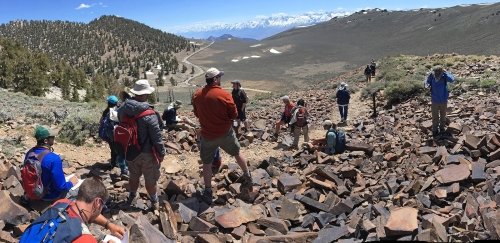
Environmental, Geographical, and Geological Sciences
Dive into the interconnected worlds of our planet's landscapes, resources, and history with our Environmental, Geographical, and Geological Sciences program.
- Degrees & Offerings
-
- B.S.
- Location
-
- Bloomsburg
- Lock Haven
- Mansfield
- Program Contact
-
Assistant Chair / Professor of Environmental, Geographical, and Geological Sciences
-
Associate Professor
Your Path to Environmental and Earth Sciences
A hidden gem in Pennsylvania, our interdisciplinary program is both broad and sufficiently in-depth to prepare environmental scientists, watershed specialists, geologists, hydrologists, geographic information systems specialists, conservation officials, fish and game officers, and emergency managers for rewarding careers right out of school or to be competitive for graduate school.
Course Delivery Format
Bloomsburg
Face-to-Face
Online
Hybrid
Lock Haven
Face-to-Face
Online
Hybrid
Mansfield
Face-to-Face
Online
Hybrid
Clearfield
Face-to-Face
Online
Hybrid
Courses and Curriculum
Our program consists of four possible tracks: Environmental Geoscience, Geography & Environmental Planning, Professional Geology, and GIS and Spatial Analysis. All four tracks start with a common core of four courses in which students study how the Earth works, the peoples of the world, the impacts people have on the environment (and the impact the environment has on us), and ways to use maps to record, store, and communicate information about the world around us. Having a common core helps build a sense of community, exposes each student to all aspects of our program, and allows majors to make more informed choices about which major track they ultimately pick.
The Environmental Geoscience track is a blend of geography and geology that utilizes the strengths of both disciplines to prepare students for graduate school or careers focusing on water and the environment such as water resources management, environmental consulting, watershed management, coastal or marine systems, and wetlands delineation and restoration.
Degree Requirements Degree Works
Note: Degree requirements effective for enrolled students beginning Fall 2023. All enrolled students, including matriculating students prior to Fall 2023, can review their degree program requirements and track progress to degree completion with our degree audit and advisement tool, Degree Works.
The Geography and Environmental Planning track prepares students for careers and for graduate school in a variety of specialties, depending on which electives and minors are taken. This track is appropriate for students interested in cartography, urban, regional, or environmental planning, geographic information systems (GIS), resource management and valuation, parks and recreation, and more.
Degree Requirements Degree Works
Note: Degree requirements effective for enrolled students beginning Fall 2023. All enrolled students, including matriculating students prior to Fall 2023, can review their degree program requirements and track progress to degree completion with our degree audit and advisement tool, Degree Works.
GIS and Spatial Analysis introduces you to the process and study of collecting, measuring, and interpreting geographic information in order to create and update maps and charts for regional planning, education, and other purposes.
Degree Requirements Degree Works
Note: Degree requirements effective for enrolled students beginning Fall 2023. All enrolled students, including matriculating students prior to Fall 2023, can review their degree program requirements and track progress to degree completion with our degree audit and advisement tool, Degree Works.
The Professional Geology track is a traditional geology program that prepares students for graduate school or certification as a Professional Geologist (P.G.), working in careers such as hydrogeology, natural hazard mitigation, mining, or fossil fuel exploration and production.
Degree Requirements Degree Works
Note: Degree requirements effective for enrolled students beginning Fall 2023. All enrolled students, including matriculating students prior to Fall 2023, can review their degree program requirements and track progress to degree completion with our degree audit and advisement tool, Degree Works.
- Environmental Geoscience
- The Environmental Geoscience Minor is intended for students in any major who are interested in customizing their degree with a focus on mineral or fossil fuel resources, surface processes, environmental consulting, etc.
- Geography
- The Geography Minor is intended for students in any major who are interested in customizing their degree with a specialty such as resource management, planning, recreation, environmental valuation, or hazard management.
- GIS and Spatial Analysis
- The GIS and Spatial Analysis Minor is intended for students in any major who are interested in customizing their degree with a focus on spatial analysis.
- Hydrology
- The Hydrology Minor is intended for students in any major interested in obtaining expertise in water resources, conservation, testing, and management.
- Safety Management
- Soil Science
- Soil Science Minor is intended for students interested in learning the properties of soil and how they influence where vegetation grows and which are the best locations for agricultural activities. Soil science looks at how soil is distributed, used, developed, and sustainably managed as a natural resource.
Students in all EGGS concentrations should:
- Demonstrate comprehension of basic principles in the primary areas of knowledge in geography or geosciences.
- Use relevant tools and instruments in a lab and/or field setting to collect and analyze data pertinent to geographical or geological problem solving.
- Evaluate and interpret both quantitative and qualitative data for problem solving.
- Communicate graphically, orally, and in writing. Students in the AAS will demonstrate their achievement of these outcomes in discipline-appropriate assessments.
EGGS Geography and Environmental Planning Program:
- Demonstrate comprehension of basic principles in the primary areas of knowledge in geography or geosciences.
- Use relevant tools and instruments in a lab and/or field setting to collect and analyze data pertinent to geographical or geological problem solving.
- Evaluate and interpret both quantitative and qualitative data for problem solving.
- Communicate graphically, orally, and in writing. Students in the AAS will demonstrate their achievement of these outcomes in discipline-appropriate assessments.
Minor Students in all EGGS concentrations should:
- Demonstrate comprehension of basic principles in the primary areas of knowledge in geography or geosciences.
- Use relevant tools and instruments in a lab and/or field setting to collect and analyze data pertinent to geographical or geological problem solving.
- Evaluate and interpret both quantitative and qualitative data for problem solving.
- Communicate graphically, orally, and in writing. Students in the AAS will demonstrate their achievement of these outcomes in discipline-appropriate assessments.
EGGS Geography Minor Students will be able to:
- Demonstrate comprehension of core concepts of geographic thought (spatial and temporal; physical, and human landscapes, and interaction between the two).
- Utilize discipline-specific methods to analyze geographic issues.
- Obtain, evaluate, and generate quantitative and qualitative spatial and temporal data.
- Communicate geographic information with maps and charts, and in writing, using appropriate methods and terminology.
Environmental, Geographical, and Geological Sciences
Coursework & Activities
Our program consists of four possible tracks: Environmental Geoscience, Geography & Environmental Planning, Professional Geology, and GIS and Spatial Analysis. All four tracks start with a common core of four courses in which students study how the Earth works, the peoples of the world, the impacts people have on the environment (and the impact the environment has on us), and ways to use maps to record, store, and communicate information about the world around us. Having a common core helps build a sense of community, exposes each student to all aspects of our program, and allows majors to make more informed choices about which major track they ultimately pick.
Common Core Courses
- EGGS 100 – Introduction to Environmental Science
- EGGS 102 – World Cultural Geography or EGGS 104 World Regional Geography
- EGGS 120 – Physical Geology with laboratory
- EGGS 242 – Mapping and GIS Fundamentals
All EGGS majors must take courses in related science disciplines such as biology, physics, chemistry, and mathematics. These are vital for developing a good understanding of the Earth and our interactions with it, and for providing students with the quantitative tools need to analyze and solve problems. For example, to treat a stream affected by acid mine drainage, one must understand basic water chemistry; to work for an alternative energy company, the essential physics of electrical generation is important; and understanding stream biology and hydrology is necessary to restore a stream damaged by dredging or bank erosion. The number and type of required cognate science and math courses varies depending on your chosen EGGS track.
In addition to courses required for the major, every student at Commonwealth University must also complete the General Education requirements. General Education courses will connect you to the world of ideas outside of EGGS, and help you develop the critical thinking and communication skills that are vital for success in every job.
Thoughtful planning will allow you to choose approved General Education courses that reflect your interests, strengthen your major, and perhaps even get you started on a related minor. For example:
- If you are interested in working for an environmental advocacy organization, Public Speaking will be of value.
- A foreign language would be of great benefit for those working or studying internationally.
- If you plan to work in public policy or get a job with a municipality, the Commonwealth, or the Federal Government, you might want to take Elements of Political Science or U.S. Government.
- Introduction to Business or Principles of Management might be appropriate for students interested in environmental consulting, where career paths often start in the field, but lead into the office where you would oversee projects and/or help manage the business.
Many of our advanced courses include built-in activities and skills that are directly relevant to your future career choices. For example, courses like EGGS 460 - Aqueous Environmental Geochemistry require small groups of students to collaborate on a high-level research project and often culminates in a presentation at the Northeastern Section Meeting of the Geological Society of America professional conference. Our advanced courses in GIS provide hands-on skills with ESRI ArcPro, the dominant GIS product used in industry. Our class in UAV Applications (EGGS 325) provides hands-on experience with terrain stitching and image analysis software, often involves group research projects, and provides the background needed to become an FAA Certified Drone Pilot. Our course in Hazardous Materials (SFGM 210) leads directly to certification in hazardous materials (HAZWOPER 40).
Capstone Experiences
Every EGGS degree track requires a capstone experience that integrates all of your previous work and shows you how it all fits together. Depending upon the track, this may involve a student-faculty research project, a high-level field course, or an internship. In every case, the goal is to prepare students to move directly into the workforce with marketable skills, or graduate school with a solid foundation in their discipline.
Pennsylvania has an embarrassingly rich array of places for field research, and our students have worked in many of the PA State Forests, like Tioga, Susquehanna, and Weiser, and along many of our local watersheds including the Fishing Creek and Briar Creek Watersheds. Mill Cove Environmental Area near Mansfield is another wonderful and accessible resource for many projects.
Many students complete internships ranging from part to full time, and these are often paid activities. Recent interns have worked in Ricketts Glen and Worlds End State Parks, Northumberland and Montour County Conservation Districts, Carroll County Planning Bureau, Union and Columbia County GIS offices, Columbia County Emergency Management, Stroud Water, City of Rehoboth Beach, Monroe Golf course, Lacawac Sanctuary, PennDOT GIS, and the U.S. Department of Energy. If you want to do it, we’ll help you get that internship.
Some of our majors complete a capstone field course. PASSHE offers an array of outstanding summer field courses at the Chincoteague Bay Field Station (CBFS) in coastal Virginia – courses like Wetlands Ecology or Coastal Environmental Oceanography. Professional Geology majors take a 4 to 6 week summer Field Camp course so they can qualify to be licensed as Professional Geologists upon graduation. These courses are offered all over the U.S. and abroad (we’ve had students go to Iceland and New Zealand!), but PASSHE also offers its own Field School that stays closer to home if that’s your desire.
Field Experiences
In addition to our built-in classroom field experiences, the EGGS Department also runs a summer three-week immersive field-based course (EGGS 230) in which students apply what they already know as well as develop their skills in observation and interpretation.
A few days getting prepped is followed by two weeks in the field, camping, hiking, and investigating the geology, geography, and environmental characteristics and processes operating in each area. Field notebooks are integrated into the course to start students on the lifelong process (and skill) of observing, recording, and reflecting on the natural world. Graduating seniors often point to this course as a highlight of their time in the major.
A generous donor to the Bloomsburg Foundation subsidizes much of the travel expenses, and the course is open to all students who have completed one or more of the EGGS core classes.
The course location varies from year to year. Previous trips have focused on these regions:
- Appalachian Transect (Coastal plain to the Appalachian Plateau)
- Death Valley and Owens Valley
- Four corners (Utah, Colorado, Arizona, New Mexico)
- Southern California - from the Coast to the High Desert
- Great Lakes Environments
- Planned future trips include:
- Return to Death Valley and Owens Valley
- Florida - Geology, Ecology, and Environmental Issues
- Great Parks of the Northern Rockies - Teton, Yellowstone, and Glacier
Professional Activities
Attending conferences allows you to hear about cutting edge science, find out more about careers in your specialty, network with faculty and students at potential graduate schools, and get excited about what you do.
Whether or not you have research to present, you should try to attend at least one conference of a professional organization – American Association of Geographers (AAG), American Geophysical Union (AGU), Geological Society of America (GSA), or others.
Our department routinely hosts recent graduates who work in our field to return to campus, either in-person or virtually, to speak with current majors about their experience at CU, how they landed their first job and advice for this process, and what their current work-life involves. Recent alumni visits have included a gold-mining geologist (zooming in from Alaska!), a PA State Game Warden, two USGS Hydrologists, a Planner with Monroe County, and a GIS Team specialist with Comcast.
If you've been working on a research project, you may also get the experience of presenting your results to a scientific audience in either a professional poster presentation or an oral presentation to an audience. This is especially important if you are thinking about graduate school because these are the same people who will make admission decisions when you apply.
Whether it’s associated with a research project, conference presentation, internship, or volunteer activity, it’s important to meet and get to know other students, faculty, and professionals in your field. All of our alumni reiterate the importance of building that network of peers, mentors, and professionals as a key to landing that first (and most important!) job.
EGGS Resources
Unearth your Passion
Clubs and Organizations
EGGS Major Club
Each EGGS campus hosts its own local EGGS major club. These are involved in volunteer activities, like cleanups and tree planting at local parks or bank stabilization/rehabilitation with local watershed groups. They organize tutoring sessions for introductory and some mid-level courses, and they host fundraisers, like plant sales, to raise funds for field trips or other activities. They are also a great way to develop life-long friends, both personally and professionally.
Gamma Theta Upsilon
The Bloomsburg campus also hosts a chapter of GTU or Gamma Theta Upsilon, the International Geographic Honor Society. Our chapter was formed in 1931 and is the fourth oldest in the United States! EGGS Geography and Environmental Planning students who have completed a minimum of 3 geography courses, have a GPA of at least 3.3 overall, and have completed at least 3 semesters or 5 quarters of college course work, are invited to become members.
This award stands out on a resume, allows one to apply for one of four undergraduate scholarships available only to GTU members, and to apply for a GTU/AAG (American Association of Geographers) travel grant to help fund your travel to the Annual AAG meeting.
Careers
Our alumni are heavily represented in professional settings throughout the mid-Atlantic and beyond. They are a fantastic resource and an immediate professional network available to all of our students. Here is a brief list of recent alumni job placements:
Potential Job Opportunities
- PA State Conservation Districts
- Environmental Compliance Services
- PA County, City, and Town Planning Offices and Agencies
- U.S. Geological Survey
- U.S. Department of Agriculture
- GIS and Cartographic Agencies
- National and State Park Services
- Pennsylvania State Game Commission
- Geotechnical Engineering and Consulting Firms
- Wetlands Delineation and Remediation Firms
- Environmental Preservation and Protection Agencies
- Pennsylvania Emergency Management Agency
- Outdoor Recreation Areas and Resorts
- Gold Mining Companies
- The Natural Gas Industry
- Safety Management Positions
- Environmental Remediation Firms
Healthy Job Growth Projected
The good news is that geoscientists, environmental scientists, cartographers, and GIS specialists are in demand and well paid. Depending upon the specific profession, 2022 median incomes range from $64,420 to $87,480 (Source: Bureau of Labor Statistics).
Program Contacts
Applying to This Program
Apply
-
Application Process
Review the step-by-step process whether you're a first-year student, transferring to CU, or more.
-
Apply Now
By starting your application, you gain access to your personalized application portal to view your progress.
-
Scholarships
As the largest comprehensive university in north central and northeastern Pennsylvania, CommonwealthU works hard to provide a world-class education that consistently rates among the best values in the nation.
Explore More
-
Explore Commonwealth University
There's no better way to learn more than to experience Commonwealth University for yourself! Set up a campus tour or connect with us virtually.
-
Connect with Your Admissions Counselor
Applying to college is a big step. You have questions, and we have answers!
-
Understanding Financial Aid
Financial Aid can be a complex topic. Our Financial Aid team is here to tell you what you need to know and help you navigate the financial aid process.

















